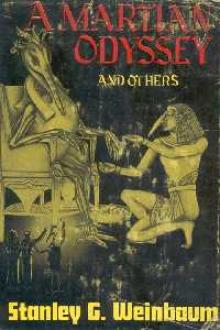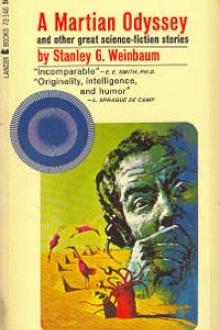Short Fiction, Stanley G. Weinbaum [chromebook ebook reader .TXT] 📗

- Author: Stanley G. Weinbaum
Book online «Short Fiction, Stanley G. Weinbaum [chromebook ebook reader .TXT] 📗». Author Stanley G. Weinbaum
Van Manderpootz had ceased to remember that he was as modest and shrinking as a violet. “It has just occurred to me,” he announced impressively, “that years have character much as humans have. This year, 2015, will be remembered in history as a very stupid year, in which the Morell prize was given to a nincompoop. Last year, on the other hand, was a very intelligent year, a jewel in the crown of civilization. Not only was the Morell prize given to van Manderpootz, but I announced my discrete field theory in that year, and the University unveiled Gogli’s statue of me as well.” He sighed. “Yes, a very intelligent year! What do you think?”
“It depends on how you look at it,” I responded glumly. “I didn’t enjoy it so much, what with Joanna Caldwell and Denise d’Agrion, and your infernal experiments. It’s all in the point of view.”
The professor snorted. “Infernal experiments, eh! Point of view! Of course it’s all in the point of view. Even Einstein’s simple little synthesis was enough to prove that. If the whole world could adopt an intelligent and admirable point of view—that of van Manderpootz, for instance—all troubles would be over. If it were possible—” He paused, and an expression of amazed wonder spread over his ruddy face.
“What’s the matter?” I asked.
“Matter? I am astonished! The astounding depths of genius awe me. I am overwhelmed with admiration at the incalculable mysteries of a great mind.”
“I don’t get the drift.”
“Dixon,” he said impressively, “you have been privileged to look upon an example of the workings of a genius. More than that, you have planted the seed from which perhaps shall grow the towering tree of thought. Incredible as it seems, you, Dixon Wells, have given van Manderpootz an idea! It is thus that genius seizes upon the small, the unimportant, the negligible, and turns it to its own grand purposes. I stand awestruck!”
“But what—?”
“Wait,” said van Manderpootz, still in rapt admiration of the majesty of his own mind. “When the tree bears fruit, you shall see it. Until then, be satisfied that you have played a part in its planting.”
It was perhaps a month before I saw van Manderpootz again, but one bright spring evening his broad, rubicund face looked out of the phone-screen at me.
“It’s ready,” he announced impressively.
“What is?”
The professor looked pained at the thought that I could have forgotten. “The tree has borne fruit,” he explained. “If you wish to drop over to my quarters, we’ll proceed to the laboratory and try it out. I do not set a time, so that it will be utterly impossible for you to be late.”
I ignored that last dig, but had a time been set, I would doubtless have been even later than usual, for it was with some misgivings that I induced myself to go at all. I still remembered the unpleasantness of my last two experiences with the inventions of van Manderpootz. However, at last we were seated in the small laboratory, while out in the larger one the professor’s technical assistant, Carter, puttered over some device, and in the far corner his secretary, the plain and unattractive Miss Fitch, transcribed lecture notes, for van Manderpootz abhorred the thought that his golden utterances might be lost to posterity. On the table between the professor and myself lay a curious device, something that looked like a cross between a pair of nose-glasses and a miner’s lamp.
“There it is,” said van Manderpootz proudly. “There lies my attitudinizor, which may well become an epoch-making device.”
“How? What does it do?”
“I will explain. The germ of the idea traces back to that remark of yours about everything depending on the point of view. A very obvious statement, of course, but genius seizes on the obvious and draws from it the obscure. Thus the thoughts of even the simplest mind can suggest to the man of genius his sublime conceptions, as is evident from the fact that I got this idea from you.”
“What idea?”
“Be patient. There is much you must understand first. You must realize just how true is the statement that everything depends on the point of view. Einstein proved that motion, space, and time depend on the particular point of view of the observer, or as he expressed it, on the scale of reference used. I go farther than that, infinitely farther. I propound the theory that the observer is the point of view. I go even beyond that, I maintain that the world itself is merely the point of view!”
“Huh?”
“Look here,” proceeded van Manderpootz. “It is obvious that the world I see is entirely different from the one in which you live. It is equally obvious that a strictly religious man occupies a different world than that of a materialist. The fortunate man lives in a happy world; the unfortunate man sees a world of misery. One man is happy with little, another is miserable with much. Each sees the world from his own point of view, which is the same as saying that each lives in his own world. Therefore there are as many worlds as there are points of view.”
“But,” I objected, “that theory is to disregard reality. Out of all the different points of view, there must be one that is right, and all the rest are wrong.”
“One would think so,” agreed the professor. “One would think that between the point of view of you, for instance, as





Comments (0)